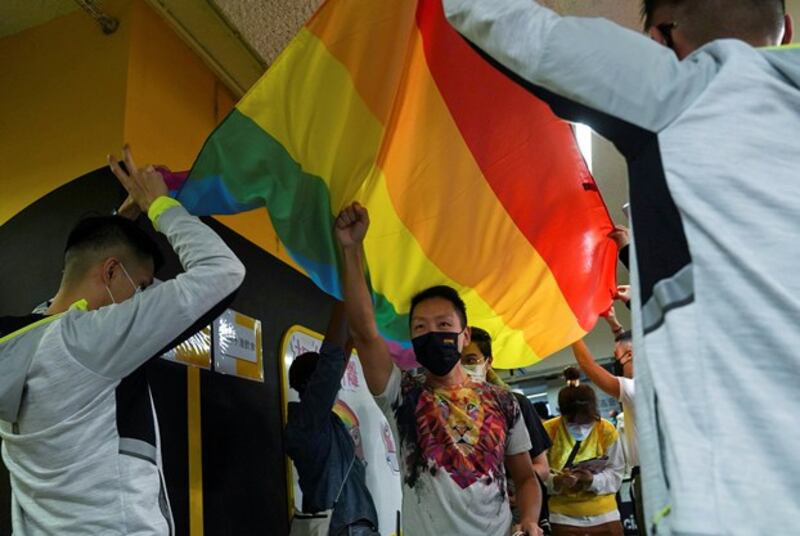Calls are growing for authorities in Hong Kong to release Lai Ke, a transgender activist from China who now faces repatriation after being jailed while transiting the city en route to Canada, her supporters and a rights group said in online statements.
Lai, who is also known as Xiran, was hauled in for questioning while transiting Hong Kong International Airport en route from Shanghai to Toronto in May 2023, and later handed a 15-month jail term for "forging" her travel documents at a secret trial with no lawyer present, according to her supporters.
As is Hong Kong's policy for trans inmates, she served her sentence at the Siu Lam Psychiatric Centre, a psychiatric detention center, and was released early for good behavior on March 2.
But instead of being released, Lai was immediately transferred to the Castle Peak Bay Immigration Detention Centre, sparking fears among her supporters and rights groups that she will be sent back to China, according to the X account @FreeLaiKe.
If she is forcibly repatriated, Lai will be "at grave risk of persecution," Amnesty International has warned.
"The Hong Kong authorities must urgently clarify Lai Ke’s pending immigration status," Amnesty International's China Director Sarah Brooks said in a statement dated March 1. "As she is due to be released after serving her sentence, authorities must free her without conditions and allow her to travel onwards to a destination feasible for her."
"In any event, the authorities must allow Lai Ke to legally challenge any deportation order following her release after serving her sentence," Brooks said.
Mistreated in detention
Lai’s supporters say that she had been a vocal advocate for trans rights back in China alongside her partner Cai Xia, who was detained by the Chinese authorities in June 2023 in connection with her activism and her transgender identity, and accused of "organizing obscene activities."
The Lai Ke (Xiran) Global Concern Group, which has been actively posting about her situation on Twitter and Instagram, said Lai had also been mistreated while in detention in Hong Kong, saying guards deprived her of her hormone medication, put her in solitary for a week calling her an "alien," and forced her to cut her hair short.
The group said Lai had suffered physically and psychologically after being deprived of her hormone replacement therapy for two months, despite having the medication in her luggage.
"Throughout her detention, Lai Ke repeatedly requested access to hormone medication, only to have these requests denied on various pretexts," it said in a statement dated Feb. 27.
"As a result, Lai Ke was forced to cease hormone replacement therapy medication for nearly two months, leading to severe physical and psychological repercussions, including instances of self-harm," it said.
Her parents weren't informed of her whereabouts until July 19, 2023, and the authorities initially claimed that there was no record of Lai having entered Hong Kong, the group claimed in the statement, which RFA was unable to verify independently.
It accused the Hong Kong authorities of "complicity" in the Chinese government's persecution of trans people.

The group also posted a letter handwritten by Lai in classical Chinese, an archaic form of the written language used by premodern writers, in which she complains about her treatment.
It said earlier attempts by Lai to write about her experiences in the detention center were censored by detention center authorities.
'Time is of the essence'
According to Amnesty International, Lai is vulnerable to repatriation under Hong Kong immigration law, because she isn't a resident of the city.
“Time is of the essence to prevent Lai Ke from being unlawfully deported to mainland China, where she would be at grave risk of serious human rights violations – including arbitrary detention, unfair trial, and even torture and other ill-treatment – due to both her transgender identity and her activism,” Brooks said.
“To return her given these risks would be an abandonment of Hong Kong’s obligations under international law," she said.
Amnesty International said it has documented systematic oppression and discrimination of transgender people in China, as well as large-scale censorship in recent years leading to the closure of online lesbian, gay, bisexual, transgender and intersex groups and social media accounts.
It said police in China have repeatedly arrested, detained and imprisoned human rights defenders of all kinds using "unjustified, broadly defined and vaguely worded charges."
Hong Kong Catholic priest and rights activist Franco Mella said that trans inmates are typically held in Siu Lam Psychiatric Centre, but that the final decision over whether to continue hormone treatment lies with the center's doctor.
"Any medications need to be discussed with the doctor -- who can approve them but can also not approve them," Mella said. "It's the doctor's decision."
He said it was unclear how long Lai might be held at the Castle Peak detention center.
"Once you go in there, there's no way of knowing when you'll be released," he said.
Crackdowns on LGBTQ+ community
LGBTQ+ activism is all but extinct in China, where the ruling Chinese Communist Party under Xi Jinping has cracked down on anyone displaying the rainbow flag in public, members of China's LGBTQ+ community told Radio Free Asia in interviews in January.
In August 2023, Chinese officials removed an LGBTQ+ anthem titled "Rainbow" by Taiwanese pop star A-Mei from her set list from a concert earlier this month in Beijing, while security guards forced fans turning up for the gig to remove clothing and other paraphernalia bearing the rainbow symbol before going in, according to media reports.
A month after that crackdown, authorities in the central Chinese city of Changsha removed the song "Womxnly" – which commemorates a Taiwanese teenager who was found dead in a school toilet after being bullied by classmates for his "feminine" appearance – from the set list of Taiwanese pop star Jolin Tsai, after it became an anthem for the island's lesbian, gay, bisexual, transexual and questioning community.
Translated by Luisetta Mudie . Edited by Roseanne Gerin.
